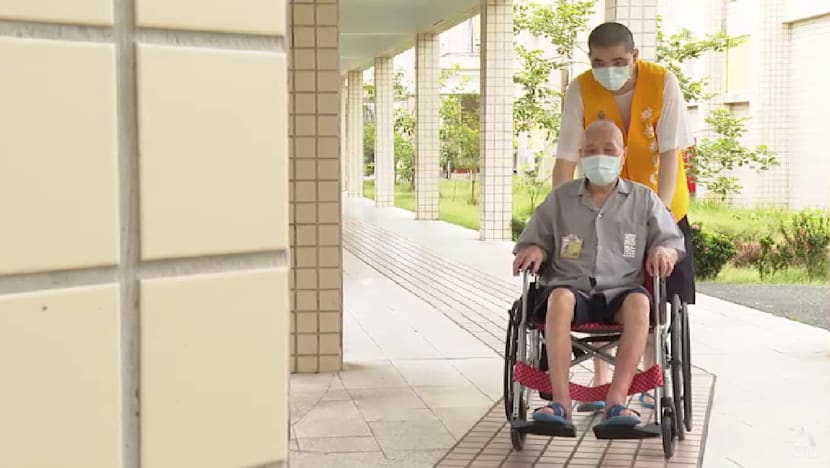Taiwan prisons grapple with growing elderly inmate population
The proportion of inmates over the age of 65 has nearly tripled over the past decade, and they now make up close to 5 per cent of the prison population.

Taiwan is grappling with a rapidly ageing society, and that challenge is also playing out behind bars. According to the Justice Ministry, the proportion of inmates over the age of 65 has nearly tripled over the past decade, and they now make up close to 5 per cent of the prison population.

This audio is generated by an AI tool.
CHIAYI, Taiwan: At 88, he stands out in Chiayi Prison not for his crime, but for his age.
Serving a one-year sentence for improper conduct, Mr Wu is the oldest inmate within its walls — and for him, the routines of prison life have become a daily struggle.
“I lack strength. If I need to move around or do something, I need my fellow inmates to help me,” he told CNA.
“Even when I sit down to eat or try to get up, I need someone to pull me up — I just don’t have the strength.”
Mr Wu is one of about 150 inmates at the facility who are over the age of 65.
Elderly prisoners like him now account for around 6 per cent of the population at the prison — three times the proportion a decade ago.
CNA can only identify the inmates by their last names due to restrictions.
AGEING SOCIETY
Taiwan is grappling with a rapidly ageing society, and that challenge is also playing out behind bars.
This greying trend, mirrored in many other prisons across the island, is forcing facilities to adapt.
According to the Justice Ministry, the proportion of inmates over the age of 65 has nearly tripled over the past 10 years, and they now make up close to 5 per cent of the prison population.
At Chiayi Prison, younger inmates often step in to help older ones such as by pushing a wheelchair or steadying a frail arm.
One of those younger inmates is Mr Hu, a 41-year-old serving an eight-year sentence for a drug-related offence.
He volunteered to become a caregiver and, after screening, underwent a formal training programme inside the prison.
“I’m fortunate to have been blessed, giving me the chance to keep improving myself during these days,” he said.
“Back then, I happened to learn about the training opportunity, and I hoped I could do some good deeds to make up for the mistakes of the past.”
Mr Hu now spends much of his day assisting elderly inmates with basic daily tasks like moving around.
ADAPTING FACILITIES
To accommodate older prisoners, Chiayi Prison houses those over 65 on the ground floor to make it easier for them to move around. Facilities have also been adapted to meet their needs.
“Whether it’s a commode, non-slip flooring or handrails, these kinds of facilities are important because as elderly people experience physical decline, their strength isn’t as good, and they’re more likely to fall,” said Chiayi Prison deputy superintendent Chung Chih-Hung.
“So when it comes to these environmental facilities, we make plans that better suit their needs.”
Adapting to life in prison is never easy, he added.
“That’s why we’ve arranged many activities — like painting, music, and other softer programmes — setting up workshops or classes like these, so that inmates can adjust to prison life a little more smoothly.”
Elderly inmates who are able to work can take on light tasks, such as folding joss paper, to stay active and engaged.
But for many senior inmates, the bigger challenge begins after release.
Mr Wu, for instance, is expected to leave next year — at the age of 89.
“I don’t have the strength to work either. And I don’t have any relatives or friends who can help me, so I just take things as they come — living one day at a time,” he said.



















